Introduction
The Israeli-Palestinian conflict has been a longstanding and contentious issue, with both sides suffering significant losses and facing numerous challenges. Recently, Amnesty International released a report alleging that Israel and the aid system in place are using starvation tactics against Palestinians in Gaza, effectively committing genocide. This shocking claim has sparked widespread outrage and calls for immediate action to address the humanitarian crisis in the region. In this article, we will delve into the details of the report, examine the current situation in Gaza, and explore the implications of these allegations.
The Amnesty International Report
The report issued by Amnesty International is a scathing indictment of the Israeli government and the aid system in Gaza. According to the report, the system used to distribute aid in Gaza is deliberately designed to keep Palestinians on the brink of starvation, making them vulnerable to exploitation and control. The report alleges that this system is a form of collective punishment, which is a violation of international law. Amnesty International has accused Israel of using starvation as a tactic to maintain its control over Gaza, effectively committing genocide against the Palestinian population.
The report is based on extensive research and interviews with Palestinians living in Gaza, as well as analysis of data and documents related to the aid system. The findings are disturbing, with evidence of widespread poverty, malnutrition, and hunger among the Palestinian population. The report also highlights the restrictions imposed by Israel on the movement of people and goods in and out of Gaza, which has exacerbated the humanitarian crisis.
The Humanitarian Crisis in Gaza
The situation in Gaza is dire, with the majority of the population living in poverty and relying on aid to survive. The blockade imposed by Israel has had a devastating impact on the economy, with unemployment rates soaring and access to basic necessities like food, water, and healthcare severely limited. The Palestinian population in Gaza is forced to rely on aid to survive, but the distribution of this aid is often restricted and controlled by Israel.
The consequences of this situation are stark. Malnutrition is rampant, with many children suffering from stunted growth and development due to lack of access to nutritious food. The healthcare system is also on the brink of collapse, with hospitals and clinics struggling to cope with the demand for medical care. The psychological toll of living under constant siege and bombardment is also significant, with many Palestinians suffering from anxiety, depression, and post-traumatic stress disorder.
International Response and Implications
The allegations made by Amnesty International have sparked widespread outrage and calls for action from the international community. The United Nations has condemned the use of starvation as a tactic, stating that it is a form of collective punishment and a violation of international law. The European Union has also expressed concern, calling for an immediate end to the blockade and the resumption of aid to Gaza.
The implications of these allegations are significant, with potential consequences for Israel and the international community. If the allegations are proven, Israel could face charges of genocide and war crimes, which would have far-reaching consequences for the country's international reputation and relationships. The international community would also be forced to re-evaluate its role in the conflict, with a potential shift in policy and approach to addressing the humanitarian crisis in Gaza.
In terms of statistics, the situation in Gaza is stark. According to the United Nations, over 70% of the population in Gaza lives below the poverty line, with over 50% relying on aid to survive. The unemployment rate is over 50%, with many young people forced to rely on precarious and informal work to make ends meet. The blockade has also had a devastating impact on the economy, with GDP per capita declining by over 50% since 2007.
Examples of the humanitarian crisis in Gaza are numerous. In 2018, the United Nations reported that over 90% of the water in Gaza was undrinkable, with many families forced to rely on expensive and unreliable private water suppliers. The healthcare system is also on the brink of collapse, with many hospitals and clinics struggling to cope with the demand for medical care. In 2020, the World Health Organization reported that over 50% of essential medicines were unavailable in Gaza, with many patients forced to travel to Israel or other countries for treatment.
Conclusion
The allegations made by Amnesty International are shocking and disturbing, highlighting the dire humanitarian crisis in Gaza. The use of starvation as a tactic is a form of collective punishment and a violation of international law, with significant implications for Israel and the international community. The situation in Gaza is complex and multifaceted, with a range of factors contributing to the crisis. However, one thing is clear: the international community must take immediate action to address the humanitarian crisis in Gaza, including an end to the blockade and the resumption of aid to the Palestinian population.
The future of Gaza and its people hangs in the balance, with the international community facing a critical choice. We can continue to stand by and watch as the humanitarian crisis deepens, or we can take action to address the root causes of the conflict and work towards a just and lasting peace. The choice is clear: we must act now to prevent further suffering and to ensure that the Palestinian population in Gaza is treated with dignity and respect.
In the words of Amnesty International, "the international community has a responsibility to act to prevent further suffering and to ensure that those responsible for these crimes are held accountable." The report is a call to action, a reminder that the situation in Gaza is not just a humanitarian crisis, but a moral and ethical imperative. We must respond to this call, working together to address the root causes of the conflict and to build a brighter future for the Palestinian population in Gaza.


Leave a comment